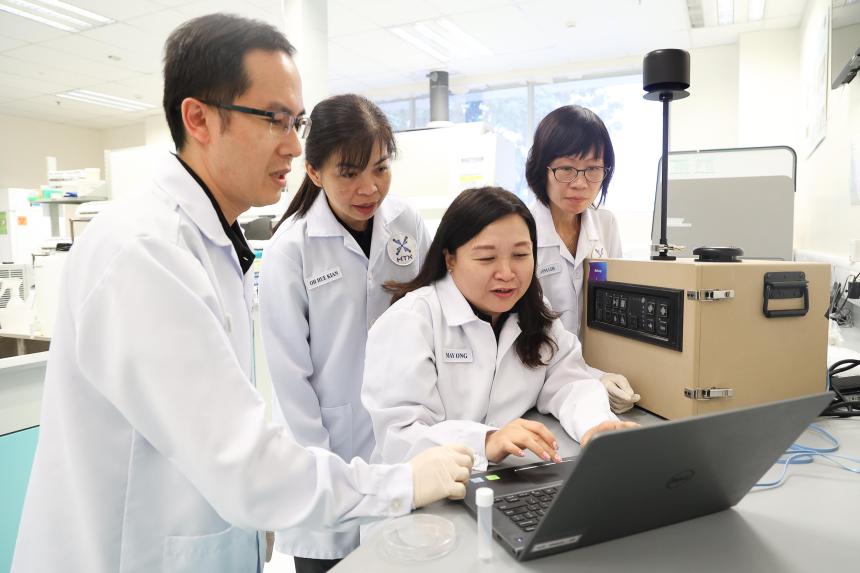SINGAPORE - A sensor that tests the air for biological agents that may be used in bioterrorism is currently being trialled, after completing lab tests in late 2022.
The Bioaerosol Threats Detector, known as BioXcap, is able to test for up to 10 different types of such agents, including anthrax, plague and toxins like ricin.
Trialled by the Home Team Science and Technology Agency (HTX), the BioXcap is the first detector of its kind here. It is able to provide early warning to the presence of biological threats in the air within 30 minutes.
Currently, it takes about three hours for air samples to be tested manually, including about an hour for the collection and transport of samples.
The BioXcap can be deployed and can relay test results remotely, minimising manpower and risks to scientists during an incident.
HTX’s Chemical, Biological, Radiological, Nuclear and Explosives (CBRNE) Centre of Expertise began work on the BioXcap in 2019, with the goal of having less manual testing and to get accurate results closer to real time.
The sensor is currently being tested at an unspecified land checkpoint. HTX declined to identify the location due to operational security.
Ms May Ong, director of the CBRNE Centre of Expertise, said enhancing Singapore’s biosurveillance capabilities is important to prevent biological threats from entering through the borders.
“It is important for us to monitor what enters through the borders so that unauthorised biological agents that may pose a threat do not come into our country,” she said.
“Biological agents are not incredibly accessible, but if someone is able to get their hands on such agents and releases them into the air, there may be mass casualties.”
Ms Ong added that while there have been no known cases of attacks involving biological agents in Singapore, it is better to be prepared for such scenarios.
“Active surveillance and preparedness are important, because it might be too late if we just wait till people start falling sick and turning up at the hospital,” she said.
“We need to know at the earliest if there is an incident, so it can be contained and our people can be protected.”
The BioXcap has an antenna-like extension that draws air samples into the main body of the sensor.
The samples are analysed inside, and the results produced within 30 minutes.
Aside from testing the samples, the sensor can also store samples of interest such as toxins for scientists to analyse.
The consumables required for testing inside the BioXcap need to be replaced only once every 24 days on average.
Dr Oh Hue Kian, principal CBRNE Centre of Expertise scientist, said that while lab tests on the system have been completed, it still needed to be stress-tested for the team to better understand how it would perform in different environments and temperatures.
She said: “This ongoing trial at the checkpoint is to make sure that the BioXcap can perform reliably under different conditions, and for us to understand its limitations.”
Ms Ong said Singapore has been conducting biosurveillance since 2009 and that the BioXcap will further enhance its capabilities.
There have been a few attacks using biological agents in the past.
The 2001 anthrax attacks in the United States left five dead and 17 injured, and involved letters containing anthrax spores mailed to several media offices and senators a week after the Sept 11 attacks.
Anthrax infection typically develops within a week, and is usually fatal but can be treated with antibiotics if detected early.
A scientist at the US government’s biodefence labs was later deemed the sole perpetrator of the attacks, but he committed suicide before the case was concluded.
It was revealed in 2022 that the Islamic State in Iraq and Syria had tried to procure biological agents from a weapons expert in 2014, with plans to attack major cities in Europe using weaponised toxins, such as ricin.
There is no known antidote to ricin, which is extracted from castor beans and can cause death within 72 hours.
More recently, a Canadian woman pleaded guilty in the US for sending a letter laced with ricin to then US President Donald Trump in 2020.
The letter was intercepted before it was delivered to the White House.
Correction note: In an earlier version of the story, we said that the BioXcap is being developed by HTX. The agency has since clarified that the sensor is developed by a science and technology company in the US, but is being trialled by HTX.


